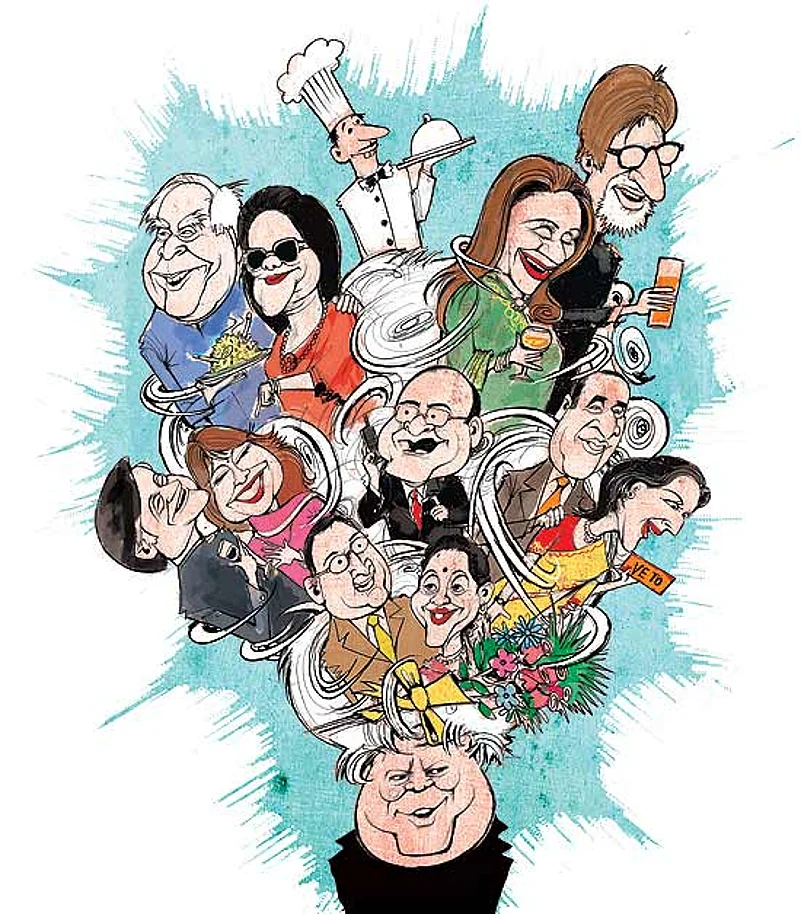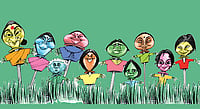How the hell does Suhel know so many people? What is his secret to cultivating important friends? I know you have all been waiting for (an answer to this) most important question. Well, here it is:
Rule 1: The Lowest Common Denominator:
(Do) not focus attention upon the type of house they (the contacts) live in or the brand of car they drive. People do not have to be bought with champagne and caviar or expensive meals at five-star hotels. You are likely to share more when you both talk about your love for cricket or savour a good biriyani. I, for one, am easily bought by mutton curry and I never get carried away with lavish preparations at my dinners. My dearest friends Pavan and Renu Varma serve delightful mutton curry at their home and that dish has been as much a cement for our friendship as my respect and affection for the two of them.
The rich are looking for honesty, not agreement. They will invariably know if you are sucking up to them because you are certainly not the only one doing so. I have always given back as good as I have got and, as you can guess by now, held on to my opinions. Some of my friendships have in fact become closer because I have challenged my friends. When I first met William Bissell of FabIndia, for instance, we had a huge argument about the levels of corruption and what he thought of austerity (he still drives around in an Ambassador car, which is perhaps why his definition of austere is stricter than mine). But knowing him and his contribution to modern India, I realised that he was right and I was wrong.
Rule 2: Don’t Call:
When friends become important, I wait for them to call; I never call them. I cannot remember a single time when I have called Arun Jaitley or Kapil Sibal or Kamal Nath, except to perhaps invite them home for a meal. It is not about being prissy but my logic is simple. Powerful people are likely to be busy. What if I call and the person does not pick up the phone because he is genuinely busy? Would I be upset by their not taking my call? Chances are, I would be. This is human nature, so it is best to avoid such scenarios and keep the rules of engagement simple and free of misunderstanding.
Rule 3: No favours:
I never ask my friends for anything. In fact, I go the opposite way and always make them feel like I am doing them a favour. When I throw a party, I am always thinking of who the most interesting people would be for my friends to meet. This is what makes the time they spend in my company enjoyable, and they appreciate me for giving them that. When I threw a party for the Bachchan family a few months ago, I invited Mr M.K. Rasgotra and his wife, who are old family friends of the Bachchans but whom they hardly see any more. Both sides were extremely touched by the gesture.
Arun Jaitley once said to some people that since his ascent to power, all his friends had asked him for something or the other. All except me. I still go to the passport offices myself without pulling strings. When I breakfast with Sheila Dikshit every few months, all I insist upon is that she serve me her famous full English breakfast, with chicken sausages and the works. Few know that I had created the ‘Bhagidari’ concept for her and this has stood her in good stead. I have never used our time to complain about illegal borewells or the stretch that has been dug up in Maharani Bagh (a major source of annoyance for me). We talk instead about gardens, grass varieties and flowers. Mrs Dikshit loves her gardens, as do I.
Other tricks of the trade:
- Always make friends with their spouse. For example, I am closer to Kapil Sibal’s wife Promilla than to Kapil. While everyone who goes to Mumbai always calls Supriya Sule, Sharad Pawar’s daughter, I make it a point only to call Sadanand, her husband, because he is my mate. Shashi Tharoor is my friend because his wife, Sunanda, and I have been friends for many years. Respect the couple. Don’t link yourself to the more powerful half. This is the golden rule. Remember, it is Nyna Mittal who has the power to veto her husband Sunil’s guest list. In fact, it’s always the wives who handle the dinner parties. It’s served me well to have been friendly with the wives and the kids.
- Having good manners always helps and is a simple way to make people feel well disposed towards you. After every dinner party, the next day I send a handwritten thank-you note and in it, I mention the couple by name. In fact, I travel with my personal stationery whenever I go. In my thank-you notes, I always make it a point to talk about the food and specifically mention the dishes. I’ll say the biriyani was particularly delicious or that the apple pie was superlative, and so on. If someone makes an effort to invite you and serve good food, you should make the effort to appreciate it as well. You may choose to send an sms or e-mail instead of a note (although, in my opinion, nothing beats a handwritten note on your own letter paper) but make sure you follow this etiquette. I often send a book with my note and invite the person to my home but I rarely send anything else. If you do bring a gift for your hosts or send them a thank-you present later, remember one thing. Gifts should be personal. They should reflect you. That is why I never send anyone big Diwali presents. They are the worst example of mass customisation and invariably get recycled.
(Suhel Seth’s Get to the Top will be in bookshops on October 21)


























